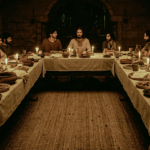Are 21st Century Christians around the world up to the challenge of witnessing to the 21st Century? Are the ways of “doing” church meeting the needs of those who now turn to the internet for everything, including “what’s the meaning of life?” Perhaps answers lie within the digital realm itself.
Insights editor Adrian Drayton attended the eFormation Conference in Washington DC this year. To find out how and what Christianity can be online.
In the THIRD part of a special FIVE-part series, thought-leader John Roberto believes digital connection is key to faith formation.
(Click here to read Part I: Virtual mission-field or Part II: Get active about online impact)
Cultivating disciples with digital connections
John Roberto of Lifelong Faith Associates is a sought-after thought leader for his work in the area of faith formation, particularly intergenerational. He is editor of the journal Lifelong Faith, as well as other books and journals about intergenerational faith formation. On the importance of that subject, he ran a number of eFormation workshops. His workshops focused upon how to create a new faith-forming ecosystem for making disciples and promoting lifelong faith growth. An ecosystem responsive to the challenges, and religious and spiritual needs, of 21st century people.
At the heart of this new format of faith formation is the rediscovery of the power of intergenerational relationships, and the events and experiences of the whole faith community. Roberto has had vast experience in developing and sustaining intergenerational relationships, faith sharing, and storytelling, incorporating all generations in worship, developing service projects that involve all ages and engaging all generations in learning together. This has informed several books he has written, and he’s also started a website that equips churches with resources.
He explained the need to think differently about faith formation in our churches. The way people spend their time on a given weekend has changed dramatically over the years and parents don’t necessarily have an active faith that can speak into the lives of their children. So, faith formation really begins by digitally reaching families within their homes.
“Online and digital is an enabler of this new ecosystem,” Roberto said. “Online is a place to gather people in one place; but it doesn’t create faith, it enables it. We have to remember that being online is a gathered connectivity – a small slice of peoples’ time.
“Digital strategy enables the connections between church and home. Our life together is formative, our events form our faith. Supporting families by surrounding them with a community of faith is an important first step.
“Parents spend a lot of time watching what their kids are doing, rather than engaging in activities with them. Faith formation starts at the family level, empowering parents with faith tools.
Times have changed. Change our ways.
Increasingly parents don’t necessarily go to church. Often they drop children off and pick them up from church-based activities. With the increasing demands on families, often Sunday’s are also full of sporting activities. With this in mind, there is a little education also required for parents. “Most parents won’t have grown up in church. Intentionally drawing in parents through relationship development is the key with faith formation.”
As a Church we need to recognise that society is out of step with Christian faith and many of our assumptions are wrong about where people are at with faith. But rather than throw hands up and admit defeat, this is a perfect example of where Baby Boomers can speak into the lives of their children. They can mentor them in their faith and, in turn, others as well.
Roberto would agree: “Our assumptions about faith formation are wrong. We need to start with parents, modelling what you want parents to do with their kids.”
Thinking differently about how intergenerational activity can work in your Church community is key. This can take the form of specially designed services that cater to all ages, or caring chats with parents as they wait for children to finish at youth group. Even developing coffee groups after-school to nurture parents can be an intentional intergenerational activity. Others include specifically designed services and curriculums such as Godly Play or Messy Church.
While this form of education and teaching about Christ and the community of faith may seem daunting, the tools online that make this type of faith formation possible are available for every congregation that has access to the internet. Get clicking…
Faith formation resources
• Children’s Ministry – Uniting Mission and Education
• Intergenerational Faith Formation
• 21st Century Faith Formation
Read the full digital issue of Insights August/September issue













